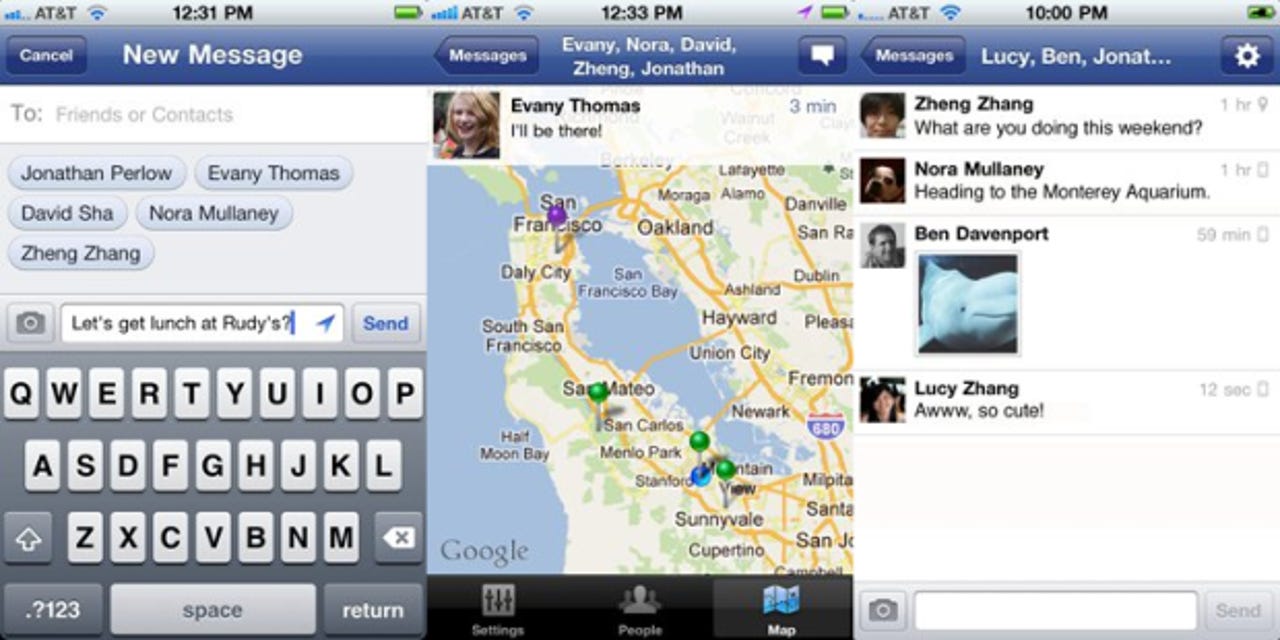Facebook launches Facebook Messenger app for Android, iPhone

Facebook today introduced Facebook Messenger, a new mobile app that lets you send and receive real-time messages with individual friends as well as small groups of friends, send photos, and privately share your location. You can grab it today in the US and Canada for Android on Google's Android Market and for the iPhone on Apple's App Store.
If your friend has the app, messages are delivered to him or her via push notifications (you can choose to mute all conversations or specific ones temporarily or indefinitely). If he or she doesn't, they are delivered via SMS, Facebook Chat, or Facebook Messages. You can thus use it to reach all of your friends – whether they're on Facebook or in your phone contacts. All you have to do is type the person's name and the message.
Note: Check out the photo galleries accompanying this article: Facebook Messenger for Android and Facebook Messenger for iPhone.
After you install it, Facebook Messenger imports all your existing Facebook inbox conversations. You can then start a conversation by adding one of more of your Facebook friends or phone numbers from your phone's contacts. If someone is both a Facebook friend and a contact on your phone, you can choose where to deliver the conversation's messages.
It's worth noting that Messenger is a separate app from the standalone Facebook app. This is the first standalone app from the social network; previously all new features were simply added to the main Facebook app on the various mobile platforms. This could be the start of a new trend: details regarding a photo sharing app for the iPhone leaked out two months ago.
Facebook sees Messenger as an extension of the recently launched Facebook messages feature, which puts all your conversations, including your texts, chats, emails, and messages, into one place. Whether you access Facebook online or on your phone, you can see the full history of all your messages.
Facebook Messenger also lets you quickly start a group conversation and message multiple people at once. If you choose to share your location (this information is kept private within a conversation, and is not published to Facebook Places), the people you're messaging with can easily find each other on a map with pushpins corresponding to their locations. There's even an option to get directions to your friends from Google Maps or Bing Maps.
If you try to add more people to a one-on-one conversation, the message history is cleared (a good move given Facebook's poor privacy history). If you add additional participants to an existing group conversation, you are warned that these new people will be able see the conversation's history.
You can also attach photos, and your friends can see and comment on them. You can optionally add a title and a photo to a given conversation.
Facebook lists three main features for the new app:
- Reach friends right on their phones – Send a message to your friends with Messenger, it goes directly to their mobile phones, so you stay in touch no matter where you go. Message any of your Facebook friends or anyone in your mobile contacts.
- Get and send messages fast – Get to your messages with one click. Mobile notifications also help make sure you never miss a message, from timely questions ("Need me to pick up anything?") to last-minute changes of plans.
- Make plans with groups on the go – Trying to plan a night out with friends? Instead of sending individual messages to all the different people in your group, now you can add everyone to one simple conversation, so everyone can be in on the plan.
This app is the result of Facebook's acquisition of Beluga, a group messaging service, just five months ago. Beluga, which is available for Android and iOS, automatically searches through your Facebook friends and adds other Beluga users. Facebook acquired the small startup because it cleverly leveraged the social network to grow its group messaging app for sending instant group messages, photos, and location information.
Most of Facebook's acquisitions have been purely a talent acquisition. Beluga is an obvious exception: Facebook found a great service that it could quickly (just five months) tweak to work on its own system.
In November 2010, Facebook announced its new Facebook Messages service, which allows users to have a @facebook.com e-mail addresses. The system is more than just email: it combines emails, text messaging, instant messaging, and regular messages. Facebook Messenger is the next step of this evolution, in my opinion, and like I said before: "Beluga's technology will play a big part in the mobile version of this feature."
"More and more of us rely on our phones to send and receive messages," a Facebook spokesperson said in a statement. "But it isn't always easy to know the best way to reach someone on their phone. Should you send an email or text? Which will they check first? Did they even get your last message? We think messaging should be easier than that. You should be able to write a message, click 'Send' and know that you will reach the person right away."
